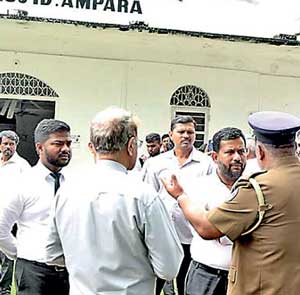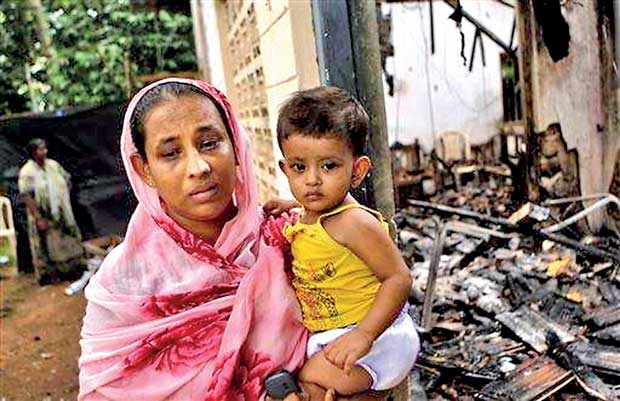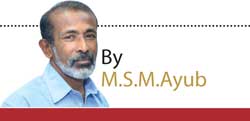Reply To:
Name - Reply Comment
Last Updated : 2024-04-26 20:44:00
The hate speeches already made by various people, especially since 2012 and the statements posted in the social media for the past six years, have fed the communities with hate

Business rivalry, envy and politics have been attributed to the recent wave of hate campaign by various groups and individuals
The rise of the percentage of Muslim population due to the drop in Tamil population from 21 percent to 12 percent was cited as an unusual growth
The deaths and migration of Tamils to other countries as a result of the war had caused an increase in the percentage of Sinhalese population as well
Most abayas sold here do not conform to the requirements taught in Islam

As it did on the wake of previous communal clashes in various places in the country, the Government said after the communal clashes in early this month that it would take action to filter the hateful statements and posts in the social media.
 It was reported that Ministers had discussions in this regard with officials of the Facebook Inc. who visited the country after the temporary ban on social media following the anti-Muslim riots in Ampara and Kandy Districts.
It was reported that Ministers had discussions in this regard with officials of the Facebook Inc. who visited the country after the temporary ban on social media following the anti-Muslim riots in Ampara and Kandy Districts.
However, the hate speeches already made by various people, especially since 2012 and the statements posted in the social media for the past six years, have fed the communities with hate sufficient to make a hell even out of a small road accident.
Interestingly, the trigger for the communal attacks in Aluthgama in 2014, in Gintota last year and in Digana this month, had been traffic issues.
However, there is a vast difference this time with Sinhalese intellectuals, Buddhist monks and the media being swift in countering the misconceptions such as the “wanda pethi” and with monks even physically coming forward to protect Muslims and their mosques in various parts of the country.
Sinhalese in Anamaduwa had dared to challenge racist elements by reconstructing an eatery that came under arson attack, within a day.
Monks in some areas had given shelter to terrified Muslim families in their temples, in spite of the Government being accused of inaction and the Police in some areas being accused of colluding with rioters.
This is a situation that could not be expected some three years ago.
Various reasons including business rivalry, envy and politics have been attributed to the recent wave of hate campaign by various groups and individuals, the prime ingredient of which has been vicious lies and distortions.
However, a sizable number of Sinhalese, including some educated people seem to succumb to those distorted campaigns.
During the Halal Controversy between 2012 and 2014, the Government or the concerned members of the business community, who had obtained the Halal Certificate voluntarily did not come forward to clear the misconception that prices had gone up due to the Halal Certificate.
Only one person had the courage to say that he had spent only 27 rupees per day for this certificate in order to broaden his market.
The Qur’an verses, almost all of which are contextual, were then cited out of context to demonize Muslims and these claims were vindicated by reports of barbaric acts of various terrorist groups in the Middle East, who are fighting each other in the name of Islam.
After being static for a century until the early eighties, the rise of the percentage of Muslim population due to the drop in Tamil population from 21 percent to 12 percent, was cited as an unusual growth in Muslim population.
In fact, the deaths and migration of Tamils to other countries as a result of the war after the eighties had caused an increase in the percentage of Sinhalese population as well.
The canards stooped to such a low level intellectually that claims were made that the welcome toffees served at certain shops owned by Muslims and under-garments sold at those shops contained sterilizing chemicals.
While the Government of the day seemed to connive with the groups spreading hate, one Minister of that Government warned that a small matchstick could create a hellhole as enough petrol had already been sprinkled all over the country.
He also suspected a foreign hand behind the hate campaign with a view to defeat President Mahinda Rajapaksa at the next Presidential election by antagonizing the Muslims against his Government. But his warnings fell on deaf ears of the leaders.
The hate campaign driving the past six years had been such that even a ‘clump of flour’ in a plate of beef curry was used to incite violence.
The hate campaign was facilitated by the Muslims as well by adamantly embracing more and more elements of Arab and Pakistani cultures such as the women’s abaya, face veil and the men’s Jubba. The more they changed their physical appearance the more did they psychologically detach themselves from the national fabric, creating an insular society amidst the Sinhalese.
This insularity is such that they, for years debate the way they should greet a non-Muslim or a Non-Muslim priest. This mindset, while strengthening the already prevalent language barrier, prevented them from not only allaying fears and misconceptions spread by the hate mongers among their neighbours but rather made the latter even to view them as strange creatures and suspect them.
The depiction of abaya, especially the black ones and the Jubba as symbols of extremism or fundamentalism is an unfounded vilification of Muslims as most of those who wear them, especially the women, do not know any politics or anything happening around them.
And there are no radical Islamic groups in Sri Lanka, except for fringe groups occasionally fighting each other over religious issues.
These attires came into the country as a result of Sri Lankans migrating to West Asian countries for employment.
However, there is no any specific reason for them to stick to those attires so admirably or adamantly in Sri Lanka, as Islam does not recommend a particular dress, but only certain requirements in any dress.
For the Muslims to assimilate with the Sinhalese in this regard is easier, as a majority of the latter has chosen, for their day-to-day use, the Western and Indian attires which are not strange or unacceptable to Muslims as well. Abaya or the Jubba is not popular among Muslims in Indonesia which is the home for the largest Muslim population in the world.
In fact, the most abayas sold at the Sri Lankan market do not conform to the requirements taught in Islam as they are so tight and decorative and pompous and also highly expensive.
The abaya, along with the face-veil, has in most cases become merely a fashion not corresponding with the Islamic way of life. Yet, certain businessmen have been successful in promoting such attires.
There is a campaign among the Muslims in the country for the proper integration of the community into the Sri Lankan social fabric, without harming the basic religious tenets, but unfortunately by a relatively small group. Their voice is hence not sufficiently heard of within the community and is not known to the Sinhalese either, due to the language barrier.
The increasing insular mindset of the Muslims and the unceasing vilification and alienation of them by hate-mongers have posed a question to the Muslims themselves as to who they are in Sri Lanka.
It is, in fact, an identity crisis. An open dialogue between the intellectuals of both the communities would help address the issue or minimise the ill effects of it.
Druvi Saturday, 24 March 2018 12:08 PM
This is another article that should be translated into Sinhala and Tamil and published in the newspapers.The sudden change in the attire of the muslims is a major cause in the distrust between the two communities. There is also jealousy and envy. There has to be a strong force of muslim intellectuals who have have to take it on their shoulders to clear up misunderstanding and to lead the muslims to a role in keeping with the liberal thinking.
Nazar Sunday, 25 March 2018 03:31 PM
Great article. Thorough analysis. Muslims should take this analysis in to their heart and show some actions.Let all major three communities live with peace and harmony in this lovely country.

Add comment
Comments will be edited (grammar, spelling and slang) and authorized at the discretion of Daily Mirror online. The website also has the right not to publish selected comments.
Reply To:
Name - Reply Comment
US authorities are currently reviewing the manifest of every cargo aboard MV
On March 26, a couple arriving from Thailand was arrested with 88 live animal
According to villagers from Naula-Moragolla out of 105 families 80 can afford
Is the situation in Sri Lanka so grim that locals harbour hope that they coul